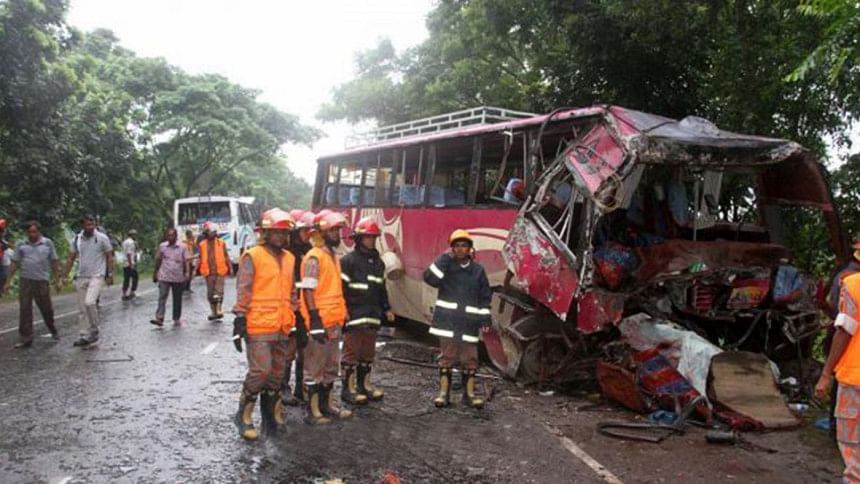On the road to road safety

Inclusion of road safety targets in the UN Sustainable Development Goals (SDGs) in the middle of the UN decade of Action for Road Safety 2011-20 has reinforced the urgency of initiating reforms or legislation for bringing discipline in the road and transport sector. SDG 11.2 calls to "provide access to safe, affordable, accessible and sustainable transport systems for all, improving road safety, notably by expanding public transport, with special attention to the needs of those in vulnerable situations, women, children, persons with disabilities and older persons" by 2030.
Deaths and damage to properties caused by road crashes have become a daily and deadly phenomenon in Bangladesh, which has one of the worst crash rates in the world, at more than 60 per 10,000 registered motor vehicles. Research studies explored multifaceted causes of road crashes ranging from population explosion, unplanned urbanisation, and tremendous growth of motorised as well as non-motorised and para-transit vehicles.
Road crash, which is caused by human or mechanical failure, negligence, or a combination of many other unknown factors, should be dealt with the principles of prevention, attention and compensation. In any human attempt to reduce fatalities of road crash, realistic legislations and their effective enforcement are a must where citizens as road users have a vital role to play. During the pre-accident period, prevention and attention are associated with the capacity and skill of concerned stakeholders where we severely lack in terms of institutional strength. Bangladesh Road Transport Authority (BRTA), which is the sole government agency responsible for looking after capacity, and providing road permits and licensing of vehicles, notably lacks skills and manpower to meet the rising demand of the road and transport sector.
The post-accident period known as the "golden hour"—the first one hour after the crash—is critical when early medical care might prevent fatalities or any dire consequences of the injury. But historically both the private and public health services-providing agencies and institutions in South Asia, including Bangladesh, are negligent about providing emergency medical services to accident victims. In addition, good Samaritans are fearful of legal consequences, harassment, involvement in litigation and repeated visits to the police station.
Responding to a writ petition of BLAST and others, on February 10, 2016 the high court issued "Rule Nisi" asking Director General of Health Services & Secretary of Ministry of Health, Ministry of Road Transport and Bridges, and Bangladesh Medical and Dental Council to pursue directions and frame guidelines to make it mandatory for all public and private hospitals and clinics to provide emergency medical services to road crash victims.
The weak and inefficient investigation process of road crashes, however, is a hurdle to justice for road crash victims. Under the current arrangement, the investigation process is undertaken by the police who investigate all forms of offences under the Code of Criminal Procedure but they are not provided with any special training on investigation of road crashes. Road safety experts and activists have been demanding for a specialised road crash investigation mechanism with institutional capacity which is a must for fighting for justice for road accident victims.
Furthermore, the traditional mindset of accusing the operators of the vehicles under collision has been found to be an obstacle to conducting a proper investigation and providing immediate medical care to the victims, contradicting the jurisprudential issues of the proposed Road Transport (draft) Act 2017.
Current legislation merely focuses on safety issues ignoring the economic potentials of the sector. A BRAC study shows that in low and middle income countries, the cost of road traffic injuries lies between 1-2 percent of GDP, which clearly suggests that countries like Bangladesh should adopt immediate measures to reduce losses caused by road accidents and keep pace with the nation's transition to becoming a middle-income economy by 2021. The World Bank in its latest study warned that if the transport sector is not managed lawfully, traffic congestion in Dhaka city alone will take up 3.2 million working hours per day, which will cost the economy billions of dollars every year.
The government has initiated legislative reforms since 2009 scrapping the Motor Vehicle Ordinance 1983, which includes the proposal for Bangladesh Road Transport Authority (draft) Act 2015 framed for empowering the Bangladesh Road Transport Authority (BRTA) and Road Transport (draft) Act 2017. It remains unclear whether the reform proposal reflects the aspirations of the citizens and those of road safety activists and experts.
Most importantly, such slow progress of reforming road safety legislation clearly misses the ever-changing ground realities. The reform process includes all stakeholders seeking recommendations for updating the draft Act but road safety activists were ignored and are not sure whether the recommendations and views shared by them will ultimately be reflected during the passage of the Road Transport Act. To make the proposed Road Transport (draft) Act 2017 genuinely comprehensive, the concerns of all stakeholders must be taken into consideration. The following issues need to be considered: (i) Current reform initiatives of the road transport legislation should not only focus on road safety issues but also focus on economic potentials of the sector considering the demographic growth of the nation; (ii) Ensure effective enforcement of Road Transport (draft) Act 2017, enactment of a Good Samaritan Law and guideline for the emergency medical services agencies and institutions should be formulated at the shortest possible time; (iii) The National Road Safety Council (NRSC) should be made more functional having periodic interaction with the subnational and regional road safety committees; (iv) An independent rigorous investigation mechanism needs to be introduced; and (v) The Road Transport (draft) Act 2017 should take into consideration the needs of all road users when making policy decisions that impact road safety.
Sadrul Hasan Mazumder is the Programme Coordinator, Advocacy for Social Change, BRAC and Coordinator, Safe Road and Transport Alliance (SROTA).
E-mail: [email protected]





Comments